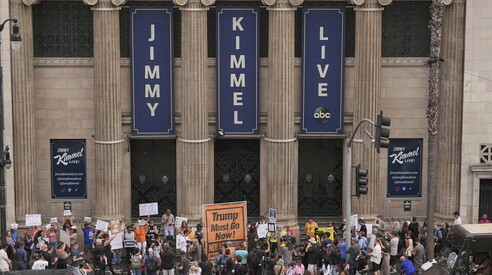Why the Disney-Kimmel case reminds us how markets help protect democracy from populists


LaPresse
The director's editorial
After Trump suspended "Jimmy Kimmel Live," the multinational's stock price fell nearly two percent, valued at approximately $3.87 billion. And Disney eventually reconsidered.
On the same topic:
Finding stable, credible, consistent, and above all effective reference points to defend liberal democracy today is a reckless, almost heroic, undertaking that rarely offers concrete satisfaction. The defense of liberal democracy today—a coherent, so to speak, non-episodic, non-instrumental defense—has unfortunately become negotiable, and one often observes around the world, around the old globe of Meloni's memory, observers, politicians, and intellectuals ready to erect barriers against illiberal floods whenever those floods have a political color other than their own. However, there is one formidable case, an exception to the rule, in which the barrier against the enemies of liberal democracy works whether the threat comes from the right or the left. The dam has been working again for a few months now, consistently but not always to the fullest, and the dam we are referring to played a significant role, a few days ago, in forcing Disney to take a step back from a choice dictated by a violent diktat from Trump: suspending “Jimmy Kimmel Live” .
Trump, you may recall, had authorized FCC Chairman Brendan Carr, chairman of the US Federal Communications Commission, to threaten Disney with retaliation if it did not suspend Kimmel's program, which Trump supporters blamed for being disrespectful to Kirk and Trump himself in a comedy sketch. On September 17, Disney chose to suspend the program. On September 22, it decided to re-air it, only changing the time. During this time, what often happens when a politician in a democracy tends to turn on the authoritarian fan occurred: the markets intervened. In this specific case, Disney stock plummeted, losing almost 2 percent, resulting in a loss of value of approximately $3.87 billion, and Disney reconsidered. This is not the first time that the market, and globalization, during the crazy, disorderly, and illiberal Trump era, have proven themselves an antidote for governing madness. It happened on April 2nd, when Trump chose to announce his Liberation Day, promising very high tariffs across half the planet. A few days later, the stock markets collapsed, US government bond yields reached alarming levels, and seven days after the announcement, Trump was forced first into a ninety-day moratorium and then into a more cautious, though still shocking, policy on tariffs.
The same process, ultimately, occurred with Elon Musk, forced to reconsider his extremism and his involvement in Trump's relationship immediately after Tesla's stock market crashes . Since Musk returned to entrepreneurship, Tesla shares have soared again (in April, a Tesla share was worth $200; today, it's $371). And the same process, ultimately, occurred in Europe, which has transformed the market into a barrier to Trumpism, to the point of considering protectionism such a dangerous weapon that it has even unblocked numerous free trade agreements to govern the illiberal hysteria of the Trump method: first with the Mercosur agreement, finally supported by Italy, and now with the agreement with Indonesia, finalized yesterday. Liberal democracy has never been under attack like it has in recent months, from those who hate it but also from those who should defend it. And now more than ever, those who in the recent past have attempted to create a symmetry between the defense of the market and the proliferation of populism must admit that they have been lying for years: the stock market helps democracy resist, the markets, as the Italian case also demonstrates, prevent populism from proliferating, and globalization helps the world ward off trade wars, and perhaps not only those.
More on these topics:
ilmanifesto





